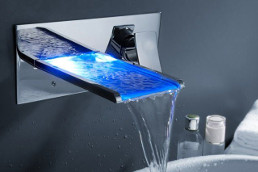1. Do not look at the sky, the private part or the stool and urine while relieving yourself.[1]
2. Do not spend more time in the toilet than is necessary. If the toilet is shared between a few people or is a public toilet, then spending more time than necessary may cause inconvenience to others.[2]
3. Relieve yourself in the squatting position. It is makrooh for one to relieve himself while standing.[3]
عن عائشة رضي الله عنها قالت من حدثكم أن النبي صلى الله عليه وسلم كان يبول قائما فلا تصدقوه ما كان يبول إلا قاعدا (سنن الترمذي، الرقم: ١٢)[4]
Hazrat Aaishah (radhiyallahu ‘anha) mentions, “Whoever informs you that Rasulullah (sallallahu ‘alaihi wasallam) would relieve himself standing, then do not believe him. Rasulullah (sallallahu ‘alaihi wasallam) would only relieve himself while sitting (squatting).”
4. Exercise extreme caution in ensuring that urine does not splash onto your body. Negligence in this regard results in severe punishment in the grave.[5]
عن أبي هريرة رضي الله عنه قال قال رسول الله صلى الله عليه وسلم أكثر عذاب القبر من البول (سنن ابن ماجة، الرقم: ٦٤٨)[6]
Hazrat Abu Hurairah (radhiyallahu ‘anhu) reports that Hazrat Rasulullah (sallallahu ‘alaihi wasallam) said, “Most of the punishment (meted out to most people) in the grave will be on account of urine (i.e. being unmindful regarding urine splashes and impurities. Therefore, their wudhu, salaah and other ibaadaat will not gain acceptance due to remaining impure).”
[1] ولا ينظر لعورته إلا لحاجة ولا ينظر إلى ما يخرج منه … ولا يرفع بصره إلى السماء (الفتاوى الهندية ١/٥٠)
[2] إن هذه الحشوش محتضرة (سنن أبي داود، الرقم: ٦)
ولا يطيل القعود على البول والغائط (الفتاوى الهندية ١/٥٠)
[3] ويكره أن يبول قائما أو مضطجعا أو متجردا عن ثوبه من غير عذر فإن كان بعذر فلا بأس به (الفتاوى الهندية ١/٥٠)
[4] قال الترمذي: حديث عائشة أحسن شيئ فى هذا الباب وأصح
قال النووي: رواه أحمد بن حنبل والترمذي والنسائي وآخرون وإسناده جيد والله أعلم وقد روي في النهي عن البول قائما أحاديث لا تثبت ولكن حديث عائشة هذا ثابت (شرح النووي على الصحيح لمسلم ١/١٣٣)
[5] والتطهير إما إثبات الطهارة بالمحل أو إزالة النجاسة عنه ويفترض فيما لا يعفى منها وقد ورد أن أول شيء يسأل عنه العبد في قبره الطهارة وأن عامة عذاب القبر من عدم الاعتناء بشأنها والتحرز عن النجاسة خصوصا البول
قال العلامة الطحطاوي رحمه الله (قوله خصوصا البول) فإنه ورد فيه استنزهوا من البول فإن عامة عذاب القبر منه وورد أن عذاب القبر من أشياء ثلاثة الغيبة والنميمة وعدم الاستنزاه من البول وقوله خصوصا مفعول مطلق والبول مفعول به أي أخص البول بأن عامة عذاب القبر منه خصوصا (حاشية الطحطاوي على مراقي الفلاح صـ ١٥٢)
[6] قال العلامة البوصيري فى زوائد ابن ماجة (صـ ٨١): هذا إسناد صحيح رجاله عن آخرهم محتج بهم فى الصحيحين
 Ihyaaud Deen An Effort to Revive Deen in Totality
Ihyaaud Deen An Effort to Revive Deen in Totality




